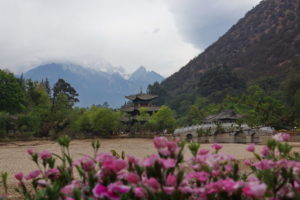
Climate Change Threatens Agriculture Jobs and May Lead to Political Instability
Climate change has the potential to cause much human and economic devastation in Southeast Asia. One area that is particularly vulnerable to climate change is agriculture. As the global climate changes, it will likely affect agriculture productivity in the region. As productivity declines economic insecurity may increase. In search of jobs, many may elect to migrate to urban areas; however, governments may be ill-equipped to handle the influx of migrants. To mitigate the threat of climate change, farmers and policymakers must be proactive, rather than reactive. They must practice better land management, adapt to more volatile weather patterns, and prepare for rapid urbanization.
What are the regional effects?
Indonesia, Thailand, and Vietnam are all threatened by a changing climate. Increasing surface air temperature, which is correlated with carbon dioxide and other greenhouse gas emissions, is causing ice sheets and glaciers to melt. As they melt, the water eventually runs into the ocean, causing sea levels to rise. Surface air temperature increases also effect rainfall patterns. As the surface air warms, it can hold more water vapor, which can lead to more intense rainstorms. Furthermore, intense rainstorms increase the risk of flooding, and much of the water from floods runs into rivers and streams. This does little to dampen the soil for crops, which increases the risk of drought.
- Indonesia is predicted to experience temperature increases of approximately 0.8 degrees Celsius by 2030. Soybean and rice yields will be affected as rainfall patterns change. Decreasing yields will likely mean fewer jobs.
- Thailand has seen an increase in temperatures and changes in rainfall patterns over the last 30 years. These changes significantly affect food production, which negatively affects jobs.
- Experts predict that 7 percent of Vietnam’s agriculture production will be affected and 5 percent of the country’s agricultural land will be lost, if sea levels rise one meter. Such loses will equate to a 10 percent reduction in GDP, negatively effecting roughly 11 percent of Thailand’s population.
Why does it matter?
As Indonesia, Thailand, and Vietnam demonstrate, climate change has the potential to threaten jobs. Given smaller yields, the agriculture sector may employ fewer people; fewer jobs may lead to economic migration. Rural poverty across the region is high, and combined with a decline in agriculture jobs, could act as a push factor for low-wage migrant workers searching for economic opportunity.
As more people move to urban areas in search of better livelihoods, potential problems mount for the central government, which can lead to political instability. People need clean water, food, and shelter, as well as access to healthcare, education, public transportation. If government institutions are already weak, providing services to a growing population will weaken them further. Widening income gaps, worsening pollution, are signs that governments are already struggling to keep up with population demands. Making matters worse, the World Bank predicts that climate change will push 77 million more urban residents in poverty, by 2030. This will make the fight for resources more intense and potentially lead to political instability as people try to hold their government accountable.
What can be done?
To mitigate the effects of climate change on the agriculture sector, farmers and policymakers must practice better land management, implement sustainable farming methods, and adapt to more volatile weather patterns. Policymakers must also prepare for urbanization.
It is possible to grow food in ways that conserve the land, research shows.
- Farmers can make the soil hardier and more able to deal with extreme weather events by planting cover crops. These plants will increase the soil’s capacity to soak up heavy rainfall and hold water for dry periods.
- Farmers can also develop diverse agroecosystems, incorporating livestock and other crops, which will reduce reliance on fertilizers and pesticides.
Governments also can take steps to help farmers adapt to climate change.
- Policymakers can invest more in public research, giving farmers the tools and resources they need to maximize efficiency and productivity.
- Policymakers must strengthen public safety nets to help communities survive the crisis and become more resilient.
- Legislators should implement policies to achieve net zero emissions.
Governments must also prepare for rapid urbanization.
- Policymakers must investment more in economic programs targeting urban poor.
- Policies must be adopted to address worsening air and water pollution.
- Human services, such as healthcare, education, affordable housing, and public transportation, must be expanded and improved to accommodate an influx of economic migrants.
Recognizing many developing countries, such as Indonesia, Thailand, and Vietnam, cannot afford to implement these policies on their own, the international community must provide financing and technical assistance. UN Climate Week is a great opportunity for the international community to recommit itself to fighting climate change and helping those countries on the frontlines. If the international community turns its back, the problems of Southeast Asia will become global problem, as the world has seen with refugees fleeing North Africa, the Middle East, and South-Central Asia.
The globe is warming, not cooling. It is imperative that Southeast Asia, with assistance from the global community, act now to mitigate and adapt to a changing climate or risk economic insecurity, forced migration, rapid urbanization and potentially political instability.





